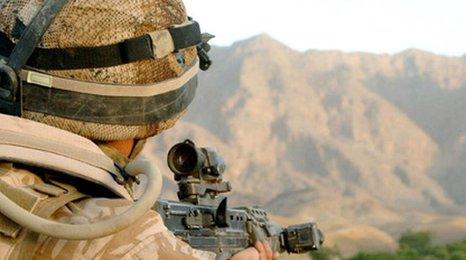Post Traumatic Stress Disorder on the rise for troops
- Published

Warzone soldiers returning with PTSD
There's been a sharp increase in soldiers returning home from war zones with Post Traumatic Stress Disorder.
The main charity which looks after troops, Combat Stress, has seen a 66% rise in the number of people coming to see them.
Newsbeat has been speaking to a lance corporal, who wants to be known simply as "Jim".
He was discharged from the army, after he had a breakdown while he was serving in Afghanistan.
It was once he got home he was diagnosed with Post Traumatic Stress Disorder (PTSD).
"First of all I developed OCD at the age of 23 when I was serving in Iraq.
"I'd have to gulp from a bottle of water exactly three times. The lads started to notice my odd behaviour, so then you withdraw."
Felt angry
But it was seeing the way the ordinary people lived in Afghanistan and Iraq that triggered off his PSTD.
"These were people with no homes, running water, food, living in broken countries, it was the first time I ever felt sad."
Jim was only diagnosed with the disorder once he got back to the UK, after spending time with his family and friends.
"I was discharged from the army. I felt let down by the system. There is a stigma attached to mental illness. I think it was seen as a weakness."
The MoD says the psychological condition only effects one per cent of people in the armed forces, but say it's getting better at dealing with it.